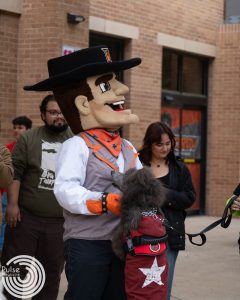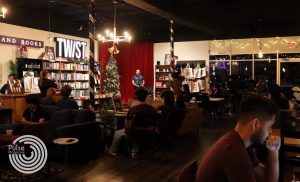The Whistle in the Hallway
If you have been in the ELABS building at The University of Texas Rio Grande Valley you must have heard it, a catchy tune hauntingly floating in the air. It’s not just entertaining, it is also the retelling of a story of love and support.
Audubon Aquarium of the Americas in New Orleans is known for its many types of nature exhibits and for the mom who fell in the shark tank back in 2002. But, two years before that, in August of 1999, in front of that same shark tank, Gregory Selber and Kimberly Paul (now Selber) met for the first time. They were attending an academic conference in the city and the opening reception was held at the Aquarium. Selber had presented his first academic paper that day and Paul was presenting her first the next day. They both planned to just pop in to the reception, ran into each other instead and spent the evening getting to know each other while exploring Bourbon Street.
The evening held many unexpected surprises. At 34 years old, Paul was working on her Ph.D. in advertising at University of Texas at Austin. Little did she know Selber, 33, was there too, working on his Ph.D. in Journalism just one floor below hers. Their offices as teaching assistants were only one floor apart. They lived just few blocks away from each other. Their friends knew each other. But they had never met. So fate, stepped in.
“We got lucky, I guess,” Selber said.
A few weeks after returning to Austin, the couple had their first official date – at the Half Price Books on Guadalupe —an activity they still enjoy today. Dates were frugal for the two college students, so they spent time at Barton Springs, laying on the grass or watching movies at home. Back then, before the on demand era, Netflix movies were ordered by mail. They picked movie collections from directors or actors, and binged the mail-ordered DVDs.
They often listened to music of their high school years on the cable music channels while discussing and analyzed music, songs, and movies, reminiscing about their pasts and learning about each other. They went to concerts and on road trips and spent a lot of time reading and working on their dissertations
At the time they met, Selber was a self-proclaimed loner and self-centered. He was a learner, more focused on writing. As a former newspaper reporter, he was good at talking to people, but he wasn’t interested in meeting anyone new or starting a relationship. He had other priorities and he wasn’t interested in looking for that special someone, even though “that was the only missing piece in my life,” Selber said.
Paul, on the other hand, was more social and enjoyed meeting new people. She was in advertising; a creative, spontaneous free spirit. Paul was sure that things either happen or they didn’t, so she wasn’t worried about finding someone. “She would have made a good hippie in the 60s,” Selber said.
But when they met, something special started. While working on their dissertations, they found their supportive groove. He would help her edit; she helped him with formatting. Even now, “since spelling is not my strong suit, he reads my stuff for me. If I ask him to edit something for me, he usually drops what he’s doing to edit it,” said Paul.
And being supportive didn’t always mean spending a lot of time together. While in school, they were busy people. They taught classes in the morning and attended classes in the afternoon. After a day full of work, they needed “me time,” not “us time,” and both agreed that it was alright to not spend every single moment of the day together it worked because the foundation of their relationship was based on trust, communication, and most importantly, support. They were both on the same path, trying to finish their respective Ph.D. “You aren´t in a doctoral program halfway, you entered to win it,” Selber said. “Writing takes quiet time to think and you can’t do that if you are always out having fun.” They wanted the best for each other and, as much as they wanted to spend time together, that often times meant just being there for each other
When she needed her time to read, to finish a paper, or study for an exam, he didn’t complain but understood the situation. He physically disappeared, but was always supportive. “He used to leave notes on my car, or a bar of chocolate in my office, little things that. It was like, ‘I’m not going to bother you, but I want you to know I´m here’,” Paul said. She always thought about him, too. “We were never about expensive gifts,” Paul said. “It was, and still is, about the thoughtfulness and the small things that make you feel special and cared about.”
Selber was creative in his own way in making sure Paul knew he cared. He loved to whistle and, as a former athlete, Selber always found ways to be active. One was that he never used the elevator, he always took the stairs. Selber would sprint up the stairs of the Jesse H. Jones Communication Center at UT Austin, to get to his office on the 4th floor and to the floor above to see Paul while whistling. “He never surprised me,” Paul laughed. “I could hear him coming down the hall whistling whatever was stuck in his head that day.” His whistle became an endearing signal. “On the day I was taking my comprehensive exams for my doctorate, I was working in a conference room near the stairwell. I was so nervous. And all of a sudden, I could hear him whistling in the stairwell. It was the most supportive thing anyone could have done for me at that moment.”
Selber graduated in 2001 with a Ph.D. in journalism and began teaching at The University of Texas-Pan American (now UTRGV). Paul, on the other hand, needed one more semester to finish her Ph.D. However, they didn’t lose contact. She still had to finish her dissertation, and there was no way he would let her finish it by herself. Paul would email her chapters late at night to Selber who would print them out and mail his edits back to her in Austin the next day.
And while their academic partnership flourished, keeping a long distance relationship going was not always easy. Of course, there were problems, there were times that neither of them knew what the future awaited. “…What was difficult was when I left. It was great when we were together. But when I left, I mean, you know, it was a little bit different,” Selber said. But relationships are about trusting each other, and to communicate, but most importantly, to truly love each other and always wishing the best for the other. “Love isn’t just about you’re not giving me enough time, but about understanding what they need too, and helping them and supporting them in what’s best for them as well,” Paul said. They loved each other so much they found themselves wishing the best for one another only to realize they were what was best for each other.
When Paul graduated in December 2001, she stayed in Austin and had been hired by UT Austin as an assistant professor the previous year—her dream job. She and Selber married in 2002 and kept a long distant relationship for another year. “It’s like being married to somebody in the military. Imagine, you know, somebody who was off. And so we knew it wasn’t a permanent thing. But we both needed to be doing what we were doing at that moment,” Paul said
The couple welcomed their first child while maintaining a long-distance household. “It was really hard not being together every day when our daughter was born,” Paul said. “I didn’t want him to miss anything.” So, in the summer of 2003, Paul decided to come to the Valley and continue their life together here. It was a tough decision, but in the end, it didn’t matter who moved, just that the family could be together.
It has been almost 18 years since they married, and the light in their eyes when talking about each other may shine brighter than before. They have been growing together all this time, not letting each other fall behind.
They are both currently faculty in the department of communication, at UTRGV. “We see each other at work, but we don’t get in each other’s way. We’re really supportive of the other and help each other as colleagues. It is very easy and very natural,” Paul said. “When we started working in the same department, I didn’t feel like we were bumping into each other all the time. We had different teaching schedules. We’re very independent in what we do. And so, I think that it works very well.”
There´s not a lot of time during the day to spend time together since they have different schedules, and they even start the day at different times. But it isn’t about seeing one another every moment of the day; it’s about letting the other know that no matter how hectic their lives get, they still care for each other. “Ever since we’ve been married, whenever he leaves, no matter what I’m doing, I always get up and walk him to the door, even when I don’t want to,” Paul said. “I always do that because, in the back of my mind, it’s like, that is a way to say you’re important. And he’ll do things like that for me, too. Just ways to show that I’m important to him.”
They are still the best decision they could have made. They value and trust each other. They have been through a lot together and still admire the other. “She’s one of the best people I’ve ever met,” Selber said. “Without a doubt, he’s one of the smartest, most amazing people I have ever known,” Paul said.





